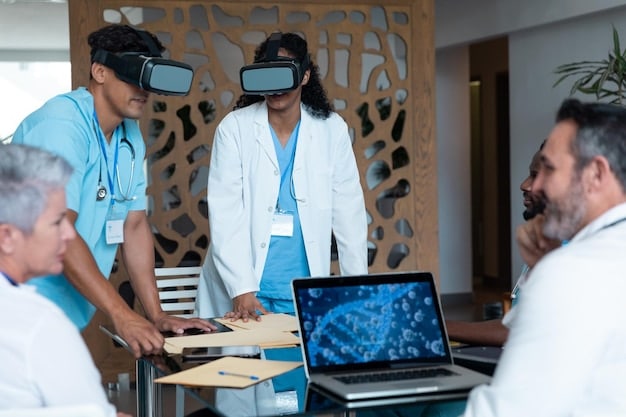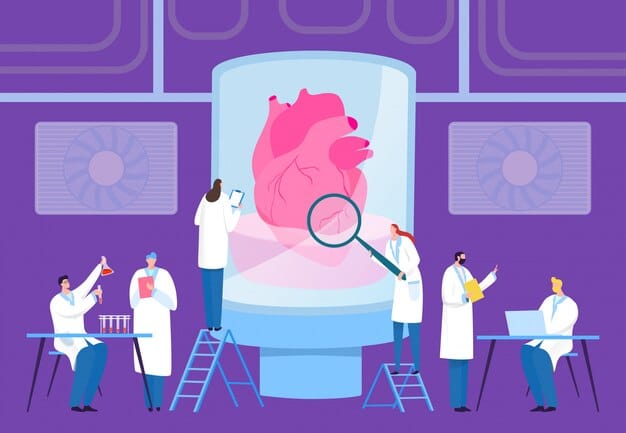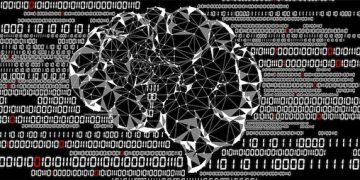AI in Medical Education: Revolutionizing US Healthcare Training

The integration of AI is revolutionizing medical education in the US, transforming how healthcare professionals are trained through personalized learning, advanced simulations, and data-driven insights.
How AI is revolutionizing medical education: Training the next generation of US healthcare professionals is no longer a distant prospect; it’s rapidly becoming the standard, offering unprecedented opportunities to enhance learning and improve patient outcomes. From personalized curricula to sophisticated simulations, AI is reshaping the landscape of medical training in the United States.
How AI is Shaping the Future of Medical Education
Artificial intelligence is rapidly changing various fields, and medical education is no exception. The integration of AI technologies promises to enhance the training of future healthcare professionals. This section explores the main ways AI is currently being implemented and considered in medical education, from personalized learning to sophisticated simulation tools.
Personalized Learning Paths
AI can analyze student performance data to create customized learning paths, tailoring content and pace to individual needs.
AI-Driven Simulations
Advanced simulations powered by AI provide realistic and interactive training environments that allow students to practice complex procedures and decision-making.
- AI algorithms analyze student performance in real-time, providing immediate feedback and guidance.
- Virtual patients driven by AI can simulate a wide range of medical conditions and complications.
- Personalized learning paths adapt to each student’s pace and learning style, optimizing their educational experience.
- AI-powered tools can identify knowledge gaps and provide targeted resources to address them.
By adapting to individual student needs, AI ensures a more effective and efficient learning process, resulting in better-prepared healthcare professionals.

The Role of AI in Enhancing Clinical Skills
Clinical skills are at the core of medical practice. AI offers innovative ways to enhance these skills through advanced simulations and diagnostic tools. This section delves into how AI is used to improve clinical decision-making, diagnostic accuracy, and procedural training.
Improving Diagnostic Accuracy
AI-powered diagnostic tools can analyze medical images, lab results, and patient data to assist in accurate and timely diagnoses.
AI-Assisted Procedural Training
AI simulations allow students to practice surgical and other invasive procedures in a risk-free environment, improving their precision and confidence.
- AI algorithms can detect subtle patterns in medical images that humans might miss, aiding in early diagnosis.
- AI-driven virtual patients can simulate a wide variety of medical conditions, providing diverse learning opportunities.
- Real-time feedback from AI systems helps students refine their techniques during simulations.
- AI can assess a student’s proficiency and readiness for real-world clinical scenarios.
By providing advanced tools and personalized feedback, AI enhances the development of core clinical skills, ultimately leading to better patient care.
Ethical Considerations and Challenges in AI Integration
The integration of AI in medical education brings numerous benefits, but also poses ethical challenges and practical considerations. Addressing these issues is crucial for responsible and effective implementation. This section discusses the potential biases in AI algorithms, data privacy concerns, and the importance of human oversight.
Addressing Bias in AI Algorithms
AI algorithms trained on biased data can perpetuate inequities in healthcare. Ensuring fairness and inclusivity is essential.
Data Privacy and Security
Protecting patient data used in AI training and simulations is paramount, requiring robust security measures and compliance with privacy regulations.
- Carefully curated and representative datasets are needed to train AI algorithms fairly.
- Transparency in AI decision-making processes can help identify and mitigate biases.
- Students need to be educated about the ethical implications of using AI in healthcare.
- Strong data encryption and access controls are necessary to protect patient privacy.
By addressing these ethical considerations, medical education can harness the full potential of AI while upholding the highest standards of patient care and ethical practice.
The Impact of AI on Curriculum Development
AI’s influence extends beyond individual learning experiences to the broader design of medical curricula. This section explores how AI can inform curriculum development by identifying emerging trends, gaps in knowledge, and opportunities for improvement. It also covers how AI is helping medical schools adapt to an ever-evolving healthcare landscape.
Identifying Knowledge Gaps
AI can analyze vast amounts of medical literature and data to pinpoint areas where current curricula fall short.
Adaptive Curriculum Updates
AI-driven insights enable medical schools to update their curricula dynamically, ensuring students learn the most relevant and current information.

Medical schools can leverage AI to ensure their programs remain cutting-edge and aligned with the needs of the healthcare industry.
Integrating AI into curriculum design helps ensure that medical education remains current, relevant, and aligned with the evolving demands of healthcare.
Future Trends in AI-Enhanced Medical Training
The field of AI in medical education is rapidly evolving, with exciting new trends on the horizon. This section explores cutting-edge technologies and innovative applications that promise to further transform medical training. It highlights advancements in virtual reality, augmented reality, and natural language processing, as well as their potential impact on student learning and patient care.
Advancements in VR and AR
Virtual and augmented reality technologies, powered by AI, offer immersive and interactive learning experiences that enhance student engagement and retention.
Natural Language Processing
AI-driven natural language processing can improve communication skills by providing feedback on student interactions with virtual patients and colleagues.
- VR simulations can recreate real-world clinical environments, allowing students to practice in realistic settings.
- AR applications can overlay digital information onto physical objects, providing contextual learning support.
- AI-powered tools can analyze student speech patterns and provide personalized feedback on communication skills.
- Chatbots can answer student questions and provide on-demand support, enhancing the learning experience.
These emerging trends promise to make medical education more engaging, effective, and accessible, preparing students for the challenges of modern healthcare.
Preparing Faculty for the AI Revolution
The successful integration of AI in medical education requires not only innovative technologies but also well-prepared faculty. This section discusses the importance of training educators to effectively use AI tools and resources. It covers professional development programs, best practices for incorporating AI into teaching, and strategies for addressing faculty concerns and resistance to change.
Professional Development Programs
Medical schools need to invest in professional development programs that equip faculty with the skills and knowledge to use AI tools effectively.
Best Practices for AI Integration
Sharing best practices and successful case studies can help faculty members embrace AI and integrate it seamlessly into their teaching.
- Workshops and training sessions can help faculty learn how to use AI tools for assessment, feedback, and curriculum design.
- Mentorship programs can pair experienced AI users with those who are new to the technology.
- Creating a supportive and collaborative environment can encourage faculty to experiment with AI and share their experiences.
- Recognizing and rewarding faculty who successfully integrate AI into their teaching can motivate others to follow suit.
By providing adequate support and training, medical schools can empower their faculty to become effective leaders in the AI revolution and enhance medical education for future generations.
| Key Point | Brief Description |
|---|---|
| 💡 Personalized Learning | AI tailors education to individual student needs. |
| 🩺 Clinical Skills | AI enhances diagnostics and procedural training. |
| 🛡️ Ethical Use | Addressing bias and data privacy is crucial. |
| 🚀 Future Trends | VR/AR and NLP will further enhance training. |
Frequently Asked Questions
▼
AI is used to personalize learning paths, enhance clinical skills through simulations, and improve diagnostic accuracy. It also helps in curriculum development by identifying knowledge gaps.
▼
Ethical concerns include bias in AI algorithms, data privacy and security, and the need for human oversight to ensure fairness and prevent perpetuation of inequities in healthcare.
▼
Medical schools can offer professional development programs, share best practices, and create supportive environments to help faculty members effectively use AI tools in their teaching.
▼
Future trends include advancements in VR and AR technologies, the use of natural language processing to improve communication skills, and the incorporation of AI-powered chatbots for student support.
▼
AI improves clinical skills by providing advanced simulations, diagnostic tools, and real-time feedback, allowing students to practice and refine their techniques in a risk-free environment.
Conclusion
In conclusion, AI is revolutionizing medical education by offering personalized learning experiences, enhancing clinical skills, and transforming curriculum development. While ethical considerations and challenges exist, the potential benefits of AI in training the next generation of US healthcare professionals are immense. By embracing these advancements, medical schools can ensure their graduates are well-prepared for the evolving landscape of healthcare.





